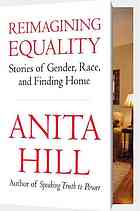
Reimagining Equality
Stories of Gender, Race, and Finding Home
کتاب های مرتبط
- اطلاعات
- نقد و بررسی
- دیدگاه کاربران
نقد و بررسی

August 1, 2011
Hill (Speaking Truth to Power) addresses the prime mortgage debacle, specifically how "wning a home, and thus acquiring this piece of the American Dream has become increasingly difficult for people of color and single women," and presents an indictment of subprime and predatory lending. Hill looks at the influence of the OYOH (Own Your Own Home) campaigns of the early 1930s and at the role of government and private developers in impeding black home ownership, even as "home became a powerful symbol of race and gender advancement, the great signifier of our belonging and independence." The experiences of two women (one in Los Angeles, the other in Baltimore) link race to both "the gender dynamics of subprime lending practices that enabled the spread of predatory loans" and to law as a "string of lawsuits filed against banks" by civic entities (e.g., Illinois, Baltimore). The unanswered "pivotal question for all of us" remains: "What can our leaders do to ensure that the home remains an integral and achievable part of the American Dream?" Hill calls for a "Home Summit," a public conversation about the housing crisis, its impact on communities, and its effect on achieving equality. Her book, lucid about law, lively with smatterings of history and reminders of cultural markers, may open that conversation.

September 1, 2011
Intriguing exploration of the social construct of "home" and its relevance to gender rights and racial equality.
Hill (Social Policy, Law, Women's Studies/Brandeis Univ.; Speaking Truth To Power, 1997) fuses elements of memoir, legal studies, history and polemic in this compact work. She suggests that the ongoing housing crisis is the latest cruel twist upon the celebrated "American dream" of home ownership, and "a tragic turning point in the search for equality in America". Hill examines a variety of narratives, including her own family history as the great-granddaughter of a slave. This leads to a chilling account of the lynching era in the Jim Crow South, which ironically strengthened black communities, who "shared a collective interest in avoiding racial violence." The author emphasizes the transformative roles of African-American women, who felt compelled to "establish their place in the communities where they settled, and thereby advance the race." While early black leaders like Booker T. Washington stressed the connections between achieving a home and a fuller citizenship for blacks in the early 20th century, suffragists like Nannie Burroughs were criticized for "promoting black women's independence from black men." But Hill looks as far back in American history as Abigail Adams to underscore that American women's understanding of the potency of home as a space for protection and social advancement transcended color and class. Yet this seemingly remained out of reach; Hill notes, for example, how the New Deal's Home Owners' Loan Corporation actually "gave its financial blessing to segregated neighborhoods," and how "postwar housing policies... affirmed racial segregation and the cult of domesticity." The author examines disgraceful attempts by Wells Fargo and other banks to promote high-risk subprime home loans in beleaguered minority communities.
Thoughtful and disturbing examination of slippery ideas, rendered in powerful prose.
(COPYRIGHT (2011) KIRKUS REVIEWS/NIELSEN BUSINESS MEDIA, INC. ALL RIGHTS RESERVED.)

September 15, 2011
In the wake of the subprime mortgage crisis, Hill (social policy, law, & women's studies, Brandeis Univ.; Speaking Truth to Power), who became famous overnight 20 years ago for speaking of sexual harassment in the Clarence Thomas hearing (not mentioned in this book), here writes compellingly on the topic of home and just what it means in America. In an approach that is both sweeping and engaging, Hill examines the role of gender and race in access to housing and the accompanying opportunities. She brings to bear her considerable skills as a scholar--the slim volume is chockablock with relevant case law and trenchant arguments regarding social policy--while invigorating her scholarship with compelling narratives from her own family's history, from the lives and work of important historical figures (from Abigail Adams to Nannie Helen Burroughs and Ida B. Wells), and from contemporary American women affected by the housing crisis. VERDICT Serious readers of all kinds, especially those interested in current affairs and social policy, will appreciate a book that is both highly readable and deeply analytical.--Rachel Bridgewater, Reed Coll. Lib., OR
Copyright 2011 Library Journal, LLC Used with permission.

October 1, 2011
Twenty years after her historic charges of workplace sexual harassment against then Supreme Court nominee Clarence Thomas, legal scholar Hill examines race and gender equality from the perspective of the home. Looking beyond the meaning of home as shelter, she explores the deeper meaning of home as the site of identity and connectedness to broader society and its specific importance to African Americans and women for becoming invested in the nation in ways that had previously been denied them. Citing her family's advancement from slaves to small farmers and landowners, Hill recalls how her background helped establish her own sense of sharing American ideals. She profiles families across the nation, particularly in inner-city communities, who have lost their homes and their stake in the American dream in the wake of predatory lending, the mortgage crisis, and financial scandals that triggered help for Wall Street but little for Main Street. Hill criticizes President Obama for failing to address issues of racial and gender inequality and offers new models and strategies for achieving equality.(Reprinted with permission of Booklist, copyright 2011, American Library Association.)

























دیدگاه کاربران